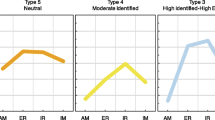Abstract
This study identifies and analyzes factors that affect a learner's knowledge, comprehension, and application of economics by racial and gender grouping. A decomposition model is used to evaluate the impact of attitudinal effects and other exogenous variables on economic cognition. Preliminary findings suggest that the attitude of black students towards economics instruction differs from their white cohorts while no gender differences are found.
Similar content being viewed by others
References
Becker, William E., John D. Helmberger, andJerry L. Thompson. “An Evaluation of a Developmental Economic Education Project Given Limited Data.”Journal of Economic Education 6 (Spring 1975): 120–124.
Blinder, Alan S. “Wage Discrimination: Reduced Form and Structured Estimates.”Journal of Human Resources (Fall 1973): 436–455.
Buckles, Stephen, andVera Freeman. “A longitudinal Analysis of a Developmental Economics Education Program.”Journal of Economic Education 15 (Winter 1984): 5–10.
Castenell, Louis A., andMae E. Castenell. “Testing, the Test: Norm-Referenced Testing and Low Income Blacks.”Journal of Counselling and Development 67 (November 1988): 205–206.
Davisson, W., andF.J. Bonello.Computer-Assisted Instruction in Economic Education: A Case Study. South Bend, IN: University of Notre Dame Press, 1976.
Eberts, Randall W., Ellen K. Schwartz, andJoe A. Stone. “School Reform, School Size, and Student Achievement.”Economic Review 26 (Second Quarter, 1990: Federal Reserve Bank of Cleveland): 2–16.
Flanagan, Robert J.. “Labor Force Experience, Job Turnover, and Racial Wage Differentials.”Review of Economics and Statistics 56 (1974): 521–529.
Heath, Julia A.. “An Econometric Model of the Role of Gender in Economic Education.”American Economic Review 79 (May 1989): 226–230.
Jackson, John D., andJames T. Lindley. “Measuring the Extent of Wage Discrimination: A Statistical Test and a Caveat.”Applied Economics 21 (April 1989): 515–540.
Lawson, Luther D., andMargaret G. O'Donnell. “Identifying Factors That Influence the Learning of Economics: A Sixth-Grade Case Study.”Journal of Economic Education 17 (Summer 1986): 177–185.
Lindley, James T., Mary Fish, andJohn Jackson. “Gender Differences in Salaries: An Application to Academe.”Southern Economic Journal 59 (October 1992): 241–259.
McConnell, Campbell R., andKim Sosin. “Some Determinants of Student Attitudes Toward Large Classes.”Journal of Economic Education 15 (Summer 1984): 181–190.
Oaxaca, Ronald. “Male-Female Wage Differentials in Urban Labor Markets.”International Economic Review 14 (October 1973): 693–709.
Palmer, John, Geoffrey Carliner, andThomas Romer. “Does High School Economics Help?”Journal of Economic Education 10 (Spring 1979): 58–61.
Phipps, Barbara J., andJames E. Clark. “Attitudes Toward Economics: Uni- or Multidimensional?.”Journal of Economic Education 24 (Summer 1993): 195–211.
Rhine, Sherrie L. “The Effect of State Mandates on Student Performance.”American Economic Review 79 (May 1989): 231–235.
Siegfried, John J.. “Male-Female Differences in Economic Education: A Survey..”Journal of Economic Education 10 (Spring 1979): 1–11.
Soper, John C., andWilliam B. Walstad. “On Measuring Economic Attitudes.”Journal of Economic Education 14 (Fall 1983): 4–17.
Walstad, William B., andJohn C. Soper. “What is High School Economics? Factors Contributing to Student Achievement and Attitude.”Journal of Economic Education 20 (Winter 1989): 23.
Watts, Michael. “Student Gender and School District Differences Affecting the Stock and Flow of Economic Knowledge.”Review of Economics and Statistics 69 (August 1987): 561–566.
Williams, Mary L., Charles Waldauer, andVijaya G. Duggal. “Gender Differences in Economic Knowledge: An Extension of the Analysis.”Journal of Economic Education 23 (Summer 1992): 219–231.
Author information
Authors and Affiliations
Rights and permissions
About this article
Cite this article
Lawson, L.D. The role of attitude in learning economics: Race and gender differences. J Econ Finan 18, 139–151 (1994). https://doi.org/10.1007/BF02920518
Issue Date:
DOI: https://doi.org/10.1007/BF02920518




